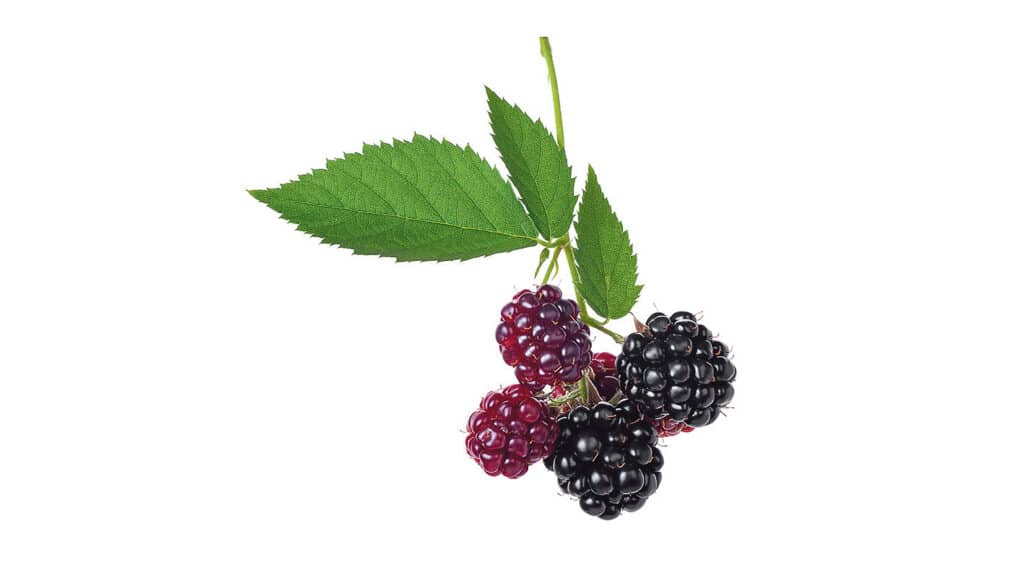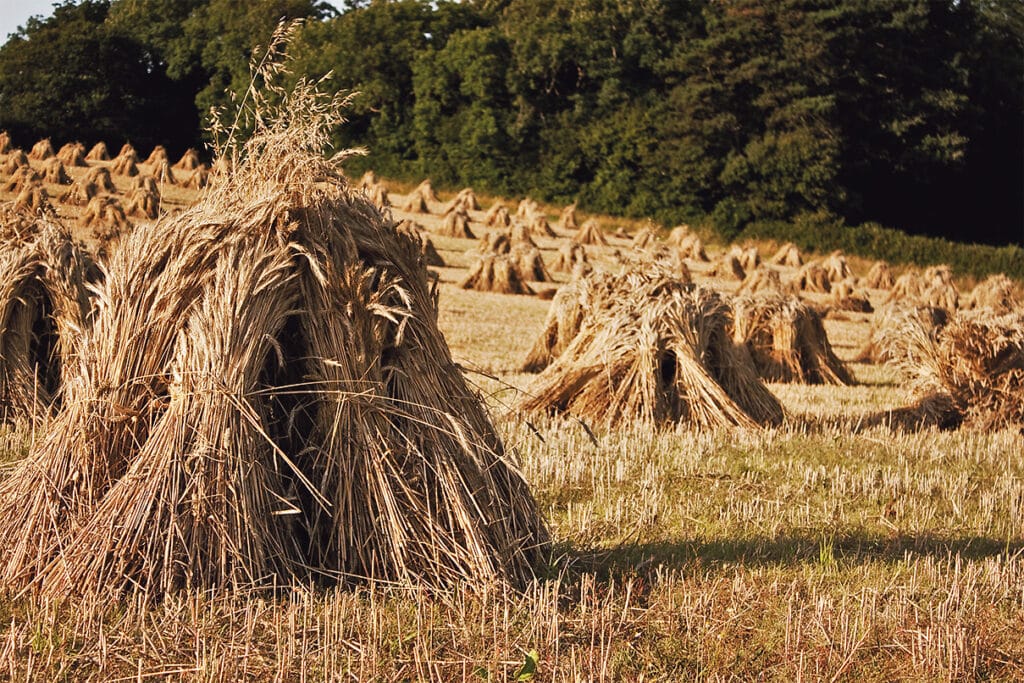
The act of picking blackberries is ingrained in the minds of most of us: We all have fond memories of carrying our buckets out into the fields and along the hedgerows to collect the luscious black fruit that hung from the brambles. It was usually sunny when we went on these excursions into the fields and along the roadsides, and the sensation of the warm sun on our backs as we leaned inwards to pick an enormous berry is embedded in my mind. At the beginning of the picking, we consumed more than we put into our assorted containers, but as the picking continued, the bowls progressively filled up, and eventually it was time to head back home. The pleasure of the day did not finish with the picking; instead, some of our crop was placed in bowls, and sugar and cream were added. This brought the total number of ingredients to three. This dish of delicious blackberries mashed with sugar and cream reflected the essence of the day, which was pure satisfaction in the bounty that nature had provided and the pleasure we got from gathering it.
Blackberries are a fruit that are only available during certain times of the year, often ripening in late summer. Their availability is linked to the shifting of the seasons, and so they are seen as a visible change of the coming of autumn. Even if there had been a late harvest, no blackberries were ever picked after Halloween, even if there were some left on the brambles. This was because October 31 is the celebration of Samhain, signifying the end of the harvest season and the start of winter, the dark half of the year. It was said that after this date, the Púca, a mischievous and sometimes malevolent supernatural creature, would spit on the blackberries, rendering them inedible and no one wants to risk messing with the fairy or spirit world.
At a practical level, any fruit after this date would not really be worth picking as they would be rather tasteless and contain too much water. Even in the early autumn, the ability of blackberries to decompose rapidly into a mess, only fit for the compost is remarkable. The flavour and keeping qualities of blackberries in early November would, I suspect, be almost nil thus giving credence to the warning not to pick this fruit after October 31.
A story about blackberries comes from the county of Meath, where there is a hill called Teevurcher. A mythical woman named Garbhóg lived on this hill. On her way to Mass, while she was fasting, she ate blackberries from the bush even though her servant boy told her not to. She turned into a monster right away and ate everything in her way, including the boy, his horse, and anyone else who had the misfortune to meet her. St. Patrick was in a church nearby, and he ran out, hit her with his stick and killed her. She fell apart into four parts that went in four different directions. This story has been passed down from generation to generation, and a mediaeval sculptured head that is said to be of her is in a church six miles away from the original spot.
From a health perspective, blackberries are also good for us. They are full of vitamin C with over 30 mg in one bowl of blackberries. Vitamin C is important for our bones, connective tissue, and blood vessels. Vitamin C also helps to reduce free radicals in the body and free radicals are unstable atoms that can cause damage to cells, thus causing many kinds of illness, Anything that gets rid of them is good news. Vitamin C also helps to absorb iron and we are all familiar with its ability to shorten the common cold by boosting the immune system.
Blackberries are full of antioxidants, especially anthocyanins, which can help protect cells from oxidative stress and lower the chance of chronic diseases like cancer and heart disease. Antioxidants also reduce blood pressure and help to manage cholesterol. Another role for antioxidants is that they may help to protect brain cells from oxidative damage. They do this by altering how brain neuron communicate, so this opens the possibility of blackberries being helpful in reducing the risk of cognitive decline. Anthocyanins help to improve insulin sensitivity and regulate blood sugar levels. This obviously makes blackberries good news for people with diabetes and those with metabolic syndrome.
Blackberries have chemicals in them that are anti-inflammatory, and these can help lower inflammation in the body. This may help people with arthritis and other diseases that cause inflammation.
Blackberries are high in fibre and a small bowl of blackberries contains almost 8 grams. We are all aware of the importance of fibre in our diet because it reduces cholesterol, regulates bowel movements, and helps promotes healthy gut bacteria.
Blackberries are also high in Vitamin K containing almost 29 mg in a small bowl. Vitamin K helps your blood to clot. Vitamin K also has a role in bone metabolism and lack of vitamin K may lead to bone thinning and bone fractures. Being deficient in vitamin K also causes easy bruising, and heavy menstrual periods. Unfortunately, if you are taking blood thinners, it is not a good idea to have too many bowls of blackberries, as they may, (depending on the quantity eaten) reduce their efficacy.
Manganese isn’t as well-known as other minerals, yet it’s essential for bone formation and immune system health. It also aids in the metabolism of carbohydrates, amino acids, and cholesterol. Manganese, like vitamin C, is essential for collagen production. Prolidase, an enzyme that helps manganese build collagen, also aids in wound healing. Manganese may aid in the prevention of osteoporosis, the management of blood sugar levels, and the reduction of epileptic convulsions. One cup of raw blackberries has 0.9 milligrams, providing about half of the daily required dose. But keep in mind that too much manganese can be harmful if you have a condition that prevents your body from removing extra manganese, such as chronic liver disease or anaemia. You are, however, unlikely to obtain too much manganese through diet.
Some research supports the importance of blackberries in dental hygiene. Blackberry extract possesses antibacterial and anti-inflammatory properties against some types of bacteria that cause mouth illness. This information is useful to remember when we return home with blackberry-stained mouths and teeth after a day’s picking blackberries.
Blackberries are not fattening and a terrific way to fulfil a sweet tooth. One small bowl of raw blackberries contains only 62 calories, one gramme of fat, and 14 carbohydrates. This makes them simple to incorporate into a healthy eating plan.
There is also good news in relation to the effect of blackberries on glucose levels. The Glycemic Index (GI) scale ranks how carbohydrate-containing foods may affect your blood glucose response and a grade of 55 or lower is thought to be less likely to cause blood sugar spikes. Blackberries have a GI of 25. As well, their glycemic load (the GI measurement plus the amount of carbohydrates in a portion) is only four, which means they are very unlikely to affect blood sugar.
Finally, on Saturday September 16, I will be involved in a clinical training workshop at Church Cross, Skibbereen. If anybody has respiratory problems, i.e shortage of breath, asthma, chronic coughs, bronchitis etc, please email me (rosari@drrosarikingston.com) for an opportunity to avail of a free consultation.



